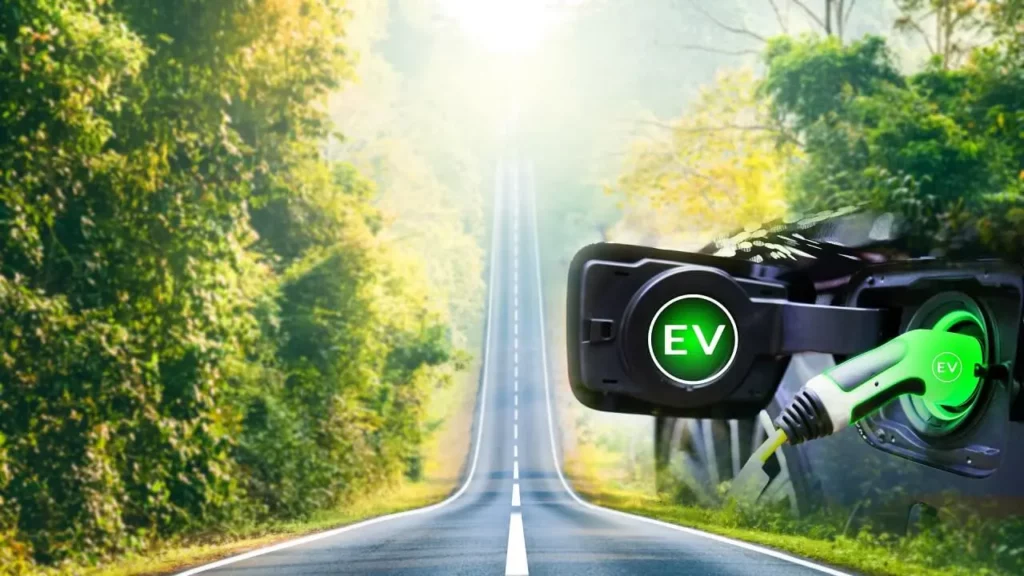Quick Summary
The electric vehicle (EV) industry in India is undergoing rapid transformation due to supportive government incentives, increasing fuel prices, and growing awareness of environmental issues. Companies involved in EVs, from automakers, battery companies, and even companies providing charging infrastructure, are becoming more viable as long-term investment opportunities. All major players like Tata Motors, TVS Motor, and Hero MotoCorp are embracing key EV initiatives, while Amara Raja, Exide Industries, and Greaves Cotton are innovating in battery technology and electric mobility.
With government support (FAME II, PLI schemes) and consumers using EVs more, the industry is expanding. Investors must evaluate R&D potential, scalability, and the company’s partnerships for infrastructure when considering investment.
This article will take a look at the highest value EV stocks, the growth potential, reasons to think these are stocks for the future are and much more, so read on.
Top 10 EV Stocks in India in 2026
| Stock Name (₹) | Market Cap (₹) | P/E Ratio | EPS (₹) | 52 Week High (₹) | 52 Week Low (₹) |
|---|---|---|---|---|---|
| Mahindra and Mahindra Ltd | 4300210868433 | 25.58 | 140.08 | 3839.9 | 2425 |
| NTPC Ltd | 3552374014633 | 14.7 | 24.93 | 372 | 292.8 |
| Maruti Suzuki India Ltd | 4801632724188 | 32.13 | 474.92 | 17370 | 11059.45 |
| Power Grid Corporation of India Ltd | 2709271336652 | 17.45 | 16.7 | 322 | 247.3 |
| Tata Motors Ltd | – | – | – | – | – |
| Bajaj Auto Ltd | 2732566625750 | 30.82 | 317.47 | 9941 | 7089.35 |
| Indian Oil Corporation Ltd | 2500587434256 | 6.83 | 25.95 | 182.25 | 110.72 |
| Eicher Motors Ltd | 2183129560700 | 40.82 | 195.02 | 7982.5 | 4646 |
| TVS Motor Company Ltd | 1825081342382 | 63.07 | 60.94 | 3909 | 2192.75 |
| Ashok Leyland | 1218120078580 | 36.84 | 5.63 | 215.42 | 95.93 |
Our selection of the top electric vehicle stocks in India for 2026 is based on several criteria. We evaluated the financial health of companies, including revenue growth, profit margins, and debt levels. We considered the companies’ market positions and their potential for future growth. Technological advancements and R&D investments were also key factors. We looked at the companies’ management teams and strategic initiatives to ensure they are well-positioned for long-term success.
Please note that the information provided in this article is for educational purposes only. It is not financial advice. Always conduct your own research before making any investment decisions.
Want a quick visual overview? Check out our Web Story on the best EV stocks in India for bite-sized insights and highlights before you dive into the full analysis below.
Overview of the Electric Vehicle (EV) Sector in India 2026
The electric vehicle (EV) sector in India has seen significant growth and transformation in 2026, driven by government policies, industry initiatives, and increasing consumer awareness. The Indian government’s commitment to reducing carbon emissions and promoting sustainable transportation has resulted in various incentives for both manufacturers and consumers. Subsidies, tax benefits, and infrastructure development are key components of the government’s strategy to accelerate EV adoption.
Leading automakers such as Tata Motors, Mahindra and Mahindra, and Maruti Suzuki have expanded their EV portfolios, launching new electric models across different vehicle segments. These companies are not only focusing on vehicle innovation but also on building the necessary infrastructure to support EVs. This includes establishing extensive networks of charging stations, which are crucial for the widespread adoption of electric mobility. These efforts are complemented by technological advancements in battery efficiency and vehicle range, making EVs more viable for consumers.
The commercial vehicle segment is also witnessing a shift towards electric solutions, with companies like Ashok Leyland introducing electric buses and trucks. The integration of renewable energy sources into the charging infrastructure is a common theme among these initiatives, ensuring that the environmental benefits of EVs are maximized. Overall, the EV sector in India is poised for continued growth, supported by collaborative efforts between the government, industry players, and technology partners.
Tata Motors Ltd
Tata Motors, a part of the USD 165 billion turnover Tata Group, is a leading global automobile manufacturer known for its cars, utility vehicles, pick-ups, trucks, and buses. As India’s market leader in commercial vehicles and a major player in the passenger vehicle segment, Tata Motors is recognized for its engineering excellence and technological prowess. The company is committed to making mobility safer, smarter, and greener, catering to over 125 countries globally.
In 2026, Tata Motors has significantly advanced its electric vehicle (EV) initiatives. The company has focused on expanding its EV portfolio, launching new models that cater to both the commercial and passenger vehicle markets. Their efforts are part of a broader strategy to prioritize sustainable mobility, emission reduction, and the use of eco-friendly materials. Tata Motors is also investing in developing infrastructure to support EV adoption, such as charging stations and service centers, reinforcing its commitment to a greener future.
Tata Motors’ comprehensive approach to the EV market highlights their dedication to innovation and sustainability. By enhancing both their product offerings and the necessary infrastructure, Tata Motors is not only meeting the current consumer demand but also paving the way for a cleaner, more sustainable transportation future.
Maruti Suzuki India Ltd
Maruti Suzuki India Ltd is a leading automobile manufacturer in India, well-known for its diverse range of hatchbacks, sedans, MUVs, and SUVs. The company operates through its ARENA and NEXA channels, offering certified pre-owned cars through TRUE VALUE and commercial vehicles via the Maruti Suzuki Commercial channel. Maruti Suzuki has established itself as a significant player in the Indian automotive market, consistently delivering reliable and affordable vehicles.
In 2026, Maruti Suzuki has outlined an ambitious strategy for its electric vehicle (EV) segment. The company is focusing on launching multiple EV models, targeting both the commercial and passenger vehicle markets. Maruti Suzuki’s EV strategy includes substantial investments in technology and infrastructure to support the growing demand for electric mobility. This involves collaborations with various technology partners and enhancements in battery technology to improve vehicle range and efficiency.
Maruti Suzuki’s commitment to sustainability is evident in its approach to reducing emissions and promoting eco-friendly practices. The company is also working on expanding its network of charging stations and service centers to ensure a seamless transition for customers adopting EVs. This comprehensive strategy underscores Maruti Suzuki’s dedication to driving the future of electric mobility in India.
NTPC Ltd
NTPC Ltd, originally known as National Thermal Power Corporation, is India’s largest energy conglomerate with a significant presence in the power generation sector, including thermal, hydro, solar, and wind power. The company is committed to providing reliable power solutions in an economical and environmentally sustainable manner. As a leader in the energy sector, NTPC plays a crucial role in meeting India’s growing energy demands.
In 2026, NTPC has made considerable efforts to expand its involvement in the electric vehicle (EV) sector. The company’s EV strategy includes significant investments in developing EV charging infrastructure across India. This involves the installation of numerous charging stations at strategic locations to support the burgeoning EV market. NTPC aims to integrate renewable energy sources into its charging infrastructure, ensuring that the electricity used for EVs is environmentally friendly. This initiative aligns with NTPC’s broader goals of promoting sustainability and reducing carbon emissions.
Mahindra and Mahindra Ltd
Mahindra and Mahindra Ltd is a household name in India, known for its robust range of vehicles, from rugged SUVs to efficient trucks. As a part of the expansive Mahindra Group, the company has its hands in a bit of everything—agriculture, aerospace, IT, and more. Their knack for innovation and a strong commitment to sustainability have positioned them as a key player in the automotive sector.
In 2026, Mahindra is making waves in the electric vehicle (EV) space. This year, they rolled out several new electric models that cater to both personal and commercial use. These vehicles boast longer battery life and smarter features, aligning with the needs of modern consumers who are increasingly eco-conscious. Mahindra isn’t just stopping at the vehicles themselves; they are also ramping up infrastructure to support EVs, including a widespread network of charging stations and dedicated service centers.
What’s truly impressive about Mahindra is their vision for a greener future. By incorporating renewable energy into their operations and focusing on sustainable materials, they are setting new standards in the industry. Their commitment isn’t just about staying ahead in the market—it’s about leading the charge towards a cleaner, more sustainable world.
Power Grid Corporation of India Ltd
Power Grid Corporation of India Ltd, commonly known as Power Grid, is a leading public sector company in India, primarily responsible for power transmission. The company plays a crucial role in ensuring the reliability and efficiency of India’s power grid, managing transmission lines and substations across the country. With its extensive network, Power Grid is pivotal in maintaining the seamless distribution of electricity from power plants to various regions, ensuring that the nation’s energy demands are met consistently.
In 2026, Power Grid is taking significant steps towards supporting the electric vehicle (EV) revolution in India. Recognizing the growing importance of EVs, the company has been focusing on developing an expansive EV charging infrastructure. This involves setting up numerous charging stations across key locations, making it convenient for EV users to recharge their vehicles. Power Grid’s initiative is part of a larger effort to promote sustainable energy solutions and reduce the carbon footprint associated with transportation.
By integrating renewable energy sources into their operations, Power Grid is not only facilitating the adoption of electric vehicles but also ensuring that the energy used is clean and sustainable. Their commitment to expanding the EV infrastructure highlights their role in driving India’s transition towards a greener future, supporting both environmental goals and the growing demand for electric mobility.
Bajaj Auto Ltd
Bajaj Auto Ltd is a name that resonates with reliability and innovation in the Indian automotive industry. Known for its extensive range of motorcycles and three-wheelers, Bajaj has carved out a significant presence not just in India but globally. From their popular Pulsar bikes to the iconic Chetak scooters, Bajaj has consistently pushed the envelope in terms of design and performance.
In 2026, Bajaj Auto is making significant strides in the electric vehicle (EV) market. The company has unveiled several new electric models, aiming to cater to the modern consumer’s need for sustainable and efficient transportation. Their flagship electric scooter, the Chetak, has been revamped with better battery life, sleek design, and advanced features, making it a top choice for urban commuters. Bajaj’s commitment to EVs is not just about the vehicles themselves; they are also focusing on developing a robust network of charging stations and service centers to ensure that EV users have a seamless experience.
What sets Bajaj apart is their holistic approach to sustainability. By investing in cleaner technologies and fostering an ecosystem that supports electric mobility, Bajaj Auto is playing a pivotal role in India’s green revolution. Their vision goes beyond just creating vehicles; they are working towards building a future where transportation is both efficient and environmentally friendly.
Indian Oil Corporation Ltd
Indian Oil Corporation Ltd (IOCL) is a name synonymous with energy in India. As the country’s largest commercial enterprise, Indian Oil has a presence across the entire hydrocarbon value chain—from refining, pipeline transportation, and marketing of petroleum products to exploration and production of crude oil and gas, marketing of natural gas, and petrochemicals. The company plays a critical role in India’s energy sector, ensuring that the nation’s fuel needs are met efficiently and sustainably.
In 2026, Indian Oil has been significantly ramping up its efforts in the electric vehicle (EV) domain. Recognizing the global shift towards sustainable transportation, the company has rolled out several initiatives to support the EV ecosystem in India. One of their key focuses is on developing a comprehensive network of EV charging stations. By strategically placing these stations across the country, Indian Oil aims to make electric mobility convenient and accessible for all. This move not only aligns with their sustainability goals but also supports the Indian government’s push towards a greener future.
Indian Oil’s foray into the EV sector is part of a broader strategy to diversify its energy portfolio and reduce carbon emissions. By investing in renewable energy sources and advanced technologies, the company is ensuring that its operations contribute to a cleaner environment. Their commitment to innovation and sustainability positions Indian Oil as a key player in India’s transition to electric mobility.
Eicher Motors Ltd
Eicher Motors Ltd is a prominent player in the Indian automotive sector, best known for its iconic motorcycle brand Royal Enfield and its commercial vehicle division, VE Commercial Vehicles. The company has a rich history of innovation and quality, which has helped it carve a niche in both the two-wheeler and commercial vehicle markets. Eicher Motors continues to build on its legacy by embracing new technologies and expanding its product offerings.
In 2026, Eicher Motors is making significant strides in the electric vehicle (EV) market. The company has been focusing on the development and rollout of electric variants of its popular models, particularly within the commercial vehicle segment. Eicher’s approach includes leveraging advanced battery technology to ensure longer range and better efficiency, catering to the increasing demand for sustainable transport solutions. The company is also investing in building the necessary infrastructure to support EV adoption, including charging stations and maintenance facilities.
Eicher Motors’ commitment to sustainability and innovation is evident in its strategic initiatives aimed at reducing the carbon footprint of its vehicles. By integrating cleaner technologies and promoting the use of electric vehicles, Eicher is playing a crucial role in shaping the future of transportation in India. Their focus on quality and reliability ensures that they remain a trusted name in the automotive industry as they navigate this new era of mobility.
TVS Motor Company Ltd
TVS Motor Company Ltd, a key player in the Indian two-wheeler market, is renowned for its wide range of motorcycles, scooters, and three-wheelers. The company’s dedication to quality and innovation has earned it a loyal customer base both domestically and internationally. Known for models like the Apache and Ntorq, TVS has continually pushed the boundaries in terms of design and performance.
In 2026, TVS Motor is making significant advancements in the electric vehicle (EV) segment, aligning with the broader industry trend towards sustainable transportation. The company has expanded its electric vehicle lineup with new models that feature improved battery technology and greater efficiency. In addition to developing these vehicles, TVS is heavily investing in EV infrastructure, establishing numerous charging stations to support the growing number of electric vehicle users. This mirrors the initiatives taken by other companies like Bajaj Auto and Indian Oil Corporation, who are also focusing on creating a supportive ecosystem for electric vehicles.
TVS Motor’s comprehensive approach to the EV market underscores its commitment to sustainability and innovation. By enhancing both their product offerings and the necessary infrastructure, TVS is not only catering to current consumer needs but also paving the way for a greener future. Their efforts are part of a larger industry movement towards reducing carbon emissions and promoting eco-friendly transportation solutions.
Ashok Leyland
Ashok Leyland, a flagship company of the Hinduja Group, is a major player in the Indian commercial vehicle industry, known for its trucks, buses, and defense vehicles. With a strong legacy of innovation and quality, Ashok Leyland has built a reputation for reliability and robustness, making it a trusted name in both domestic and international markets.
In 2026, Ashok Leyland has taken significant steps towards embracing electric mobility. The company has unveiled several electric vehicle models, particularly focusing on electric buses and trucks. These vehicles are designed to meet the growing demand for sustainable and efficient transportation solutions. Ashok Leyland is also investing heavily in building the necessary infrastructure to support the widespread adoption of electric vehicles. This includes setting up a network of charging stations, similar to initiatives by other industry players like TVS Motor and Bajaj Auto.
Ashok Leyland’s commitment to sustainability is evident in its comprehensive approach to reducing the carbon footprint of its vehicles. By incorporating advanced technologies and fostering an ecosystem that supports electric mobility, the company is not only addressing current market needs but also contributing to a greener future. Their efforts align with the broader industry trend of promoting eco-friendly transportation solutions, ensuring that Ashok Leyland remains at the forefront of the EV revolution.
Why Invest in Electric Vehicle Stocks in India?
Investing in Electric Vehicle (EV) stocks in India presents a compelling opportunity due to the sector’s substantial growth potential. Various reasons are driving this growth, such as:
The Indian government’s policies and incentives to boost EV adoption. These include tax benefits, subsidies for manufacturers and consumers, and initiatives to develop charging infrastructure.
Rising environmental awareness and the need for cost-effective transportation drive increased demand for EVs in India. Consumers increasingly seek eco-friendly alternatives to traditional vehicles as urban pollution concerns grow.
India’s large population and growing middle class represent a vast potential market for EVs. As technology improves and costs decrease, EVs become more accessible to a broader range of consumers, further fueling market growth.
Also, investing in Indian EV stocks offers exposure to this emerging sector at a relatively early stage. While risks exist, including technological challenges and competition, the potential for high returns is significant as the market matures and expands.
Factors to Consider Before Investing in EV Stocks
The EV market is dynamic and rapidly evolving, making it essential for investors to conduct thorough research before committing their capital. Here are the crucial aspects to evaluate when considering EV stock investments:
Market Trends
Stay informed about global and local EV market trends. Look at adoption rates, consumer preferences, and growth projections. Understanding these trends can help you identify companies well-positioned to capitalise on market momentum.
Company Fundamentals
Analyse the financial health and business model of EV companies. Examine metrics like revenue growth, profit margins, and debt levels. A solid business model with a clear path to profitability is crucial for long-term success in this competitive industry.
Technological Innovations
Assess the company’s advancements in EV technology. Look for innovations in battery technology, charging infrastructure, and autonomous driving capabilities. Companies leading in technological advancements are more likely to maintain a competitive edge.
Regulatory Environment
Consider government policies and regulations impacting the EV sector. These can include tax incentives, emissions standards, and infrastructure development plans. Favourable regulations can significantly boost EV adoption and benefit companies in the sector.
Conclusion
The electric vehicle (EV) landscape in India is rapidly evolving, driven by a confluence of government policies, technological advancements, and growing consumer awareness. Leading automakers such as Tata Motors, Maruti Suzuki, and Mahindra and Mahindra are spearheading this transformation with innovative electric models and substantial investments in EV infrastructure. Their efforts, complemented by companies like Ashok Leyland and Power Grid Corporation of India, ensure that both the commercial and passenger vehicle segments are well-equipped to meet the increasing demand for sustainable transportation solutions. This collective push towards electrification highlights a significant shift in the Indian automotive industry, positioning it firmly on the path to a greener future.
Remember that you should never be carried away by the potential of a single sector. As an investor, the factor that is most in your control is the risk you take, and managing that risk over the long term is key to success. So spread your investments across two or three electric vehicle companies, as well as other sectors to mitigate your investment risk. Diversifying your portfolio can help reduce the impact of market volatility and company-specific risks.
Also Read: Why diversification is important
To get really savvy with your risk management and optimise your portfolio for growth at the same time, consider geographic diversification as well. For example, you can invest in US stocks through the Appreciate App, including US electric vehicle stocks. US stocks have (historically ) outperformed Indian stocks, and over the years, the Indian rupee has consistently lost value against the US dollar. By investing in US stocks, you are now getting to be on the side that is benefiting from the rupee falling, not suffering from it.
Frequently Asked Questions about EV Stocks in India
Which EV has the highest market share in India?
Tata Motors currently holds over two-thirds of India’s electric vehicle market, making it the dominant player. This leadership is attributed to their early entry into the EV market, extensive product range, and consistent innovation, which have helped them maintain a significant competitive edge.
What is the analysis of the EV sector in India?
The India Electric Vehicle Market is projected to grow from USD 34.8 billion in 2026 to USD 120 billion by 2030, at a CAGR of 22.92%. This rapid growth is driven by increasing government support, technological advancements, and rising consumer awareness about sustainable transportation.
Why is the EV market growing in India?
The EV market in India is growing due to supportive government policies, incentives, and infrastructure development aimed at reducing carbon emissions and dependence on fossil fuels. These strategies have created a favourable environment, boosting demand for electric vehicles nationwide.
Disclaimer: Investments in securities markets are subject to market risks. Read all the related documents carefully before investing. The securities quoted are exemplary and are not recommendatory.
Disclaimer
The information provided in this article is for educational and informational purposes only. It should not be considered as financial or investment advice. Investing in stocks involves risk, and it is important to conduct your own research and consult with a qualified financial advisor before making any investment decisions. The author and publisher are not responsible for any financial losses or gains that may result from the use of this information.
If you’re interested in buying the popular US Stocks, you can read the following articles:
How to Buy Apple Shares in India
How to Buy Amazon Shares from India
How to Buy Google Shares from India
How to Buy Microsoft Shares from India
How to Buy Tesla Shares in India























